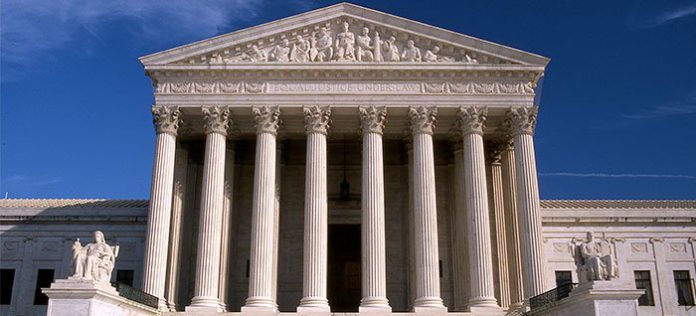

Employers that require workers’ claims against them go to arbitration received big news last week.
The Supreme Court held May 21 that an employer’s right to enforce arbitration agreements under the Federal Arbitration Act doesn’t conflict with workers’ rights under the National Labor Relations Act. The decision in Epic Systems Corp v. Lewis, and the consolidated cases, extends the long-running streak of Supreme Court decisions supporting mandatory arbitration clauses, this time addressing employment arbitration specifically. While employer-side attorneys call the decision significant, they say employers should still be mindful of how they draft and enforce arbitration provisions for workplace issues.
The court decided Epic Systems in a 5-4 majority, which also applied to the consolidated cases of Ernst & Young LLP, et al v. Morris et al and NLRB v. Murphy Oil. In each of the cases before the court, workers sought to have their Fair Labor Standards Act wage-and-hour claims litigated as class or collective actions. In each case, the employer had employees sign agreements to arbitrate those claims.
But the plaintiffs argued that the National Labor Relations Act protects workers’ rights to class or collective actions, and that conflict makes the arbitration agreements null under the Federal Arbitration Act’s “saving clause.”
The plaintiffs’ theory that class and collective actions count as NLRA-protected “concerted activity” was a recent development. Courts and government agencies haven’t seen the FAA and NLRA to conflict throughout their coexistence dating back to 1935, and the NLRB’s general counsel in 2010 expressed a favorable view of arbitration for employees, the court noted. But ever since the NLRB held in its 2012 D.R. Horton decision that the NLRA overrules the FAA, courts have grappled with the board’s position.
The majority held that the NLRA’s concerted activity language in Section 7 doesn’t stretch to cover class and collective actions, however.
“The NLRA secures to employees rights to organize unions and bargain collectively, but it says nothing about how judges and arbitrators must try legal disputes that leave the workplace and enter the courtroom or arbitral forum,” wrote Justice Neil Gorsuch for the majority.
The majority continued, saying Section 7 “does not express approval or disapproval of arbitration. It does not mention class or collective action procedures. It does not even hint at a wish to displace the Arbitration Act — let alone accomplish that much clearly and manifestly, as our precedents demand.”
Those precedents included the 2011 decision AT&T Mobility LLC v. Concepcion, which the majority cited heavily in interpreting the FAA’s protection of mandatory arbitration.
Todd Fredrickson, a Denver-based partner at Fisher Phillips, said with the Epic Systems decision, “the enforceability of [arbitration] provisions is pretty well solidified” for worker disputes.
Fredrickson said he’s “long been a proponent of arbitration” being used for employment disputes, though it does have its pros and cons for employers to consider. “There’s a lot to be said for arbitration, like the speed with which you can get a case resolved,” he said.
The process can be more predictable than litigation, as employers are less likely to see an outlier outcome, such as a “renegade” jury award, he added.
But employers shouldn’t assume arbitration will save on legal costs in every case, Fredrickson said: “I’m finding more and more that employment-related arbitration is becoming every bit as expensive as litigation.” While the process might not be as drawn out as court proceedings, arbitration can still entail depositions, discovery, hiring experts and other costly items.
Where the Epic Systems decision could have the most impact is in FLSA claims defense, said Barbara Grandjean, a partner at Husch Blackwell in Denver who represents employers in workplace matters.
“I think this opens the door for employers with properly crafted arbitration agreements to require wage-and-hour claims to be arbitrated and not litigated,” Grandjean said.
She also pointed out that while the decision is a win for employers, they should still be mindful of how they craft their arbitration clauses in employment agreements and whether they even want to have them for all dispute types.
“Just saying you’re going to require arbitration doesn’t explain what that’s going to look like,” Grandjean said. She added that “a prudent employer” would be thinking of the procedural details, like which arbitration rules will apply and what timeframe it must follow. Otherwise, that can lead to employment arbitration sometimes costing more than if the dispute went to court, she said.
Despite the support of the courts, some employers are voluntarily dropping mandatory arbitration for certain disputes. Employers like Uber are publicly stepping away from requiring arbitration on sexual misconduct claims.
In the current #MeToo climate, these companies might be trying to create a positive image of transparency in “allowing the light of day to shine on sexual harassment claims,” and don’t want to be seen as hiding those issues through arbitration, Grandjean said.
For that reason, she added, employers might be considering using “bifurcated” arbitration agreements, which might say that wage-and-hour claims must go to arbitration but other workplace matters don’t.
Although arbitration provisions continue to enjoy support from the Supreme Court, a robust opposition to them remains.
Justice Ruth Bader Ginsberg penned a 30-page dissent saying, among other things the majority failed to recognize the “labor market imbalance” that necessitated NLRA protections. But a change in the status quo on arbitration rights might be more likely to come from the legislature than from courts.
“We’re dealing with really old statutes,” Grandjean said. “So the question is if Congress now would see some benefit to changing that or modernizing that in any way.”
— Doug Chartier

